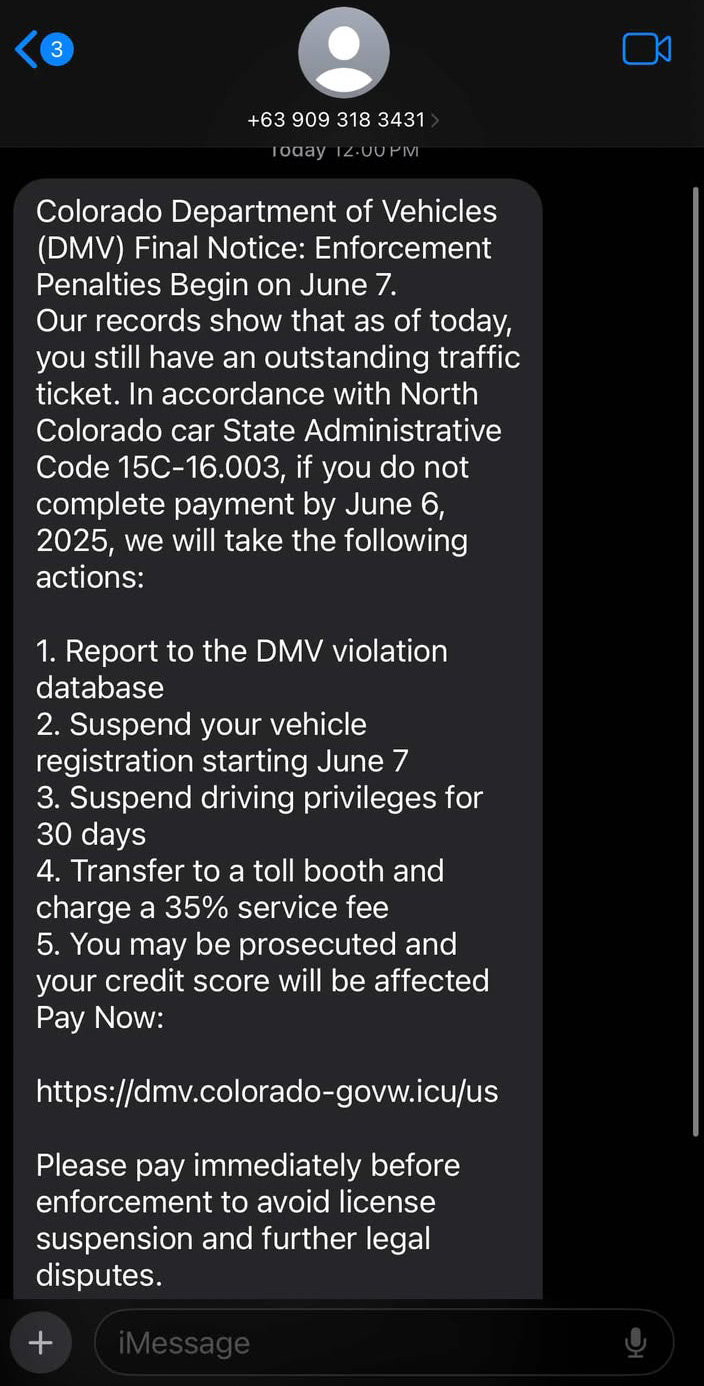Fraud Alerts/Scams
Scam Alert: Fraudulent Texts Impersonate the Colorado DMV
The Colorado Division of Motor Vehicles (DMV) is alerting Coloradans to a new wave of fraudulent messages. Scammers are now directly impersonating the DMV, falsely claiming recipients have unpaid tickets and threatening severe consequences such as prosecution, suspension of vehicle registration, and revocation of driving privileges. These claims are entirely false and designed to intimidate individuals into immediate compliance.
These deceptive text messages and emails are crafted to appear as official communications from the Colorado DMV. Their primary goal is to frighten recipients into clicking malicious links and divulging personal or financial information under the guise of settling non-existent violations.
While the exact wording can vary, these fraudulent messages typically:
- State they are from the "Colorado DMV" or a similar official-sounding entity.
- Allege outstanding unpaid tickets or violations.
- Threaten imminent legal action, such as prosecution.
- Warn of pending suspension of vehicle registration and/or driving privileges.
- Contain a link to a fake website to "resolve" the issue or make a payment.
It is critical for all Coloradans to understand: These messages are NOT from the Colorado DMV. The DMV does not initiate contact via unsolicited text messages and emails to demand payment for tickets or to threaten prosecution or suspension of privileges in this manner.
If you receive a suspicious message claiming to be from the DMV:
- Do NOT click on any links. These links often lead to fake websites designed to steal your information.
- Do NOT share any personal or financial information. This includes your driver's license number, Social Security number, credit card details, or banking information.
- Do NOT reply to the message.
If you are concerned about the status of your driver's license, vehicle registration, or any potential tickets, contact the Colorado DMV directly through its official website at dmv.colorado.gov or by phone at (303) 205-5600. Do not use any contact information provided in the suspicious text.
If you have not engaged in any activity that would result in a ticket or penalty, it is almost certainly a scam.
You can report scams and suspicious communications to the Federal Trade Commission and/or the Internet Crime Complaint Center.
If you think you've fallen for a scam text:
- Immediately change your passwords for any accounts that may have been compromised.
- Contact your bank or financial institution to report the incident and take any necessary steps to protect your accounts, such as freezing them or monitoring for suspicious activity.
- Consider a fraud alert or credit freeze. To start layering protection, you might want to place a fraud alert or credit freeze on your credit file with all three of the primary credit bureaus. This makes it harder for fraudsters to open new accounts in your name.
- Stay Vigilant. Fraud, especially identity theft, might not be immediately apparent. It is vital to keep your finger on your financial pulse in the coming weeks and months. You can report confirmed cases of identity theft to the Federal Trade Commission at identitytheft.gov.
The Colorado DMV urges all residents to be extremely cautious and to share this warning with friends and family. Vigilance is key to protecting your personal information from these evolving scams.

Scam text example
Identity Theft Fraud Alert
- Each year, millions of Americans fall victim to scams perpetrated from all over the globe. Although it is difficult to determine exact figures, the Federal Trade Commission (FTC) estimates that, last year alone, more than $1.7 billion was lost due to fraudulent activity. While exact figures are not available, it is also estimated fraud losses total in the hundreds of millions of dollars in Colorado alone.
- Consumer education is the best weapon in the fight against fraud, therefore, being knowledgeable of the tactics used by scammers will greatly reduce your chances of becoming a victim.
- More fraud prevention information
Vehicle Title Fraud Alert
- NMVTIS was created to protect consumers from vehicle fraud and unsafe vehicles. AAMVA has developed a video to raise awareness of NMVTIS and its potential use by anyone considering buying a used vehicle. State agencies use NMVTIS information as part of their vehicle titling process, consumers would benefit from using the same system. Before purchasing a used vehicle please watch this video.
Four versions of the video are available:
- NMVTIS Vehicle History for Consumers‚ English
- NMVTIS Vehicle History for Consumers, English, Closed Captioned
- NMVTIS Vehicle History for Consumers, Spanish
- NMVTIS Vehicle History for Consumers, Spanish, Closed Captioned
Fake DMV Website, Fraud Alert - VIDEO
- Please be aware of fraudulent websites providing DMV services. They could be trying to steal your personal identifying information.
- Please be aware of websites that are not affiliated with the Colorado DMV but do provide service to consumers.
- Always use the direct website www.colorado.gov/dmv when conducting DMV business.
- Always look for a disclaimer at the top or bottom of the site that says they are not affiliated with any Government agency.
Helpful Link:
National Highway Traffic Safety Administration Recall Information